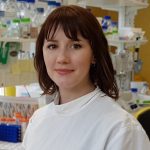Many MS therapies suppress the immune system, and there has been concern that this may put people living with MS at greater risk of COVID-19. If MS therapies suppress the immune system, this might hamper the fight against infection with SARS-CoV2, the virus that causes COVID-19. Emerging data from multi-national registries following people with MS suggests that most disease-modifying therapies do not increase the risk of developing severe COVID-19. However, treatments that reduce B cells in the body, such as Ocrevus (ocrelizumab) appear to slightly increase the risk of developing both COVID symptoms and more severe disease. About a third of Australian people living with MS (~ 4000-5000 patients) are treated with Ocrevus.
By measuring antibodies against SARS-CoV2 in the blood, we can detect whether someone has been infected. These tests can detect people who have been infected and have not shown any symptoms. It is believed that the true rate of SARS-CoV2 infection may be 10 times higher if we could detect asymptomatic infections. To understand COVID-19 risk in MS, it is essential that we understand the true infection rates and whether immune response to SARS-CoV2 is different in people on MS therapies.
The team’s MS immunology researcher, Associate Professor Fabienne Brilot-Turville, developed a novel antibody test, superior to available commercial assays, that detects the antibody to the “spike protein” of the SARS-CoV2 virus with high sensitivity and specificity. In this project, the team will test people with MS treated with a variety of MS therapies.
The overall aim of the team’s work is to monitor levels of antibodies to SARS-CoV2 and characterise how strongly the antibodies block the virus in people with MS. This project was the first step to understanding the antibody-based immunity to COVID-19 in the MS population in Australia to give a clearer picture of the risk associated with SARS-CoV2 infection in MS.
The presence of SARS-CoV-2 antibodies has been determined in 303 people living with MS in Australia in 2020-2021 before they were vaccinated against COVID-19. All were negative for these antibodies, suggesting a low infection rate in the MS population.
This study has been expanded to include analysis of the immune response to SARS-CoV2 after vaccination of people living with MS. Further funding has been awarded (Novartis and MS Australia) and outcomes will be reported in due course.
Updated 31 March 2022
$25,000
2021
1 year
Current project




